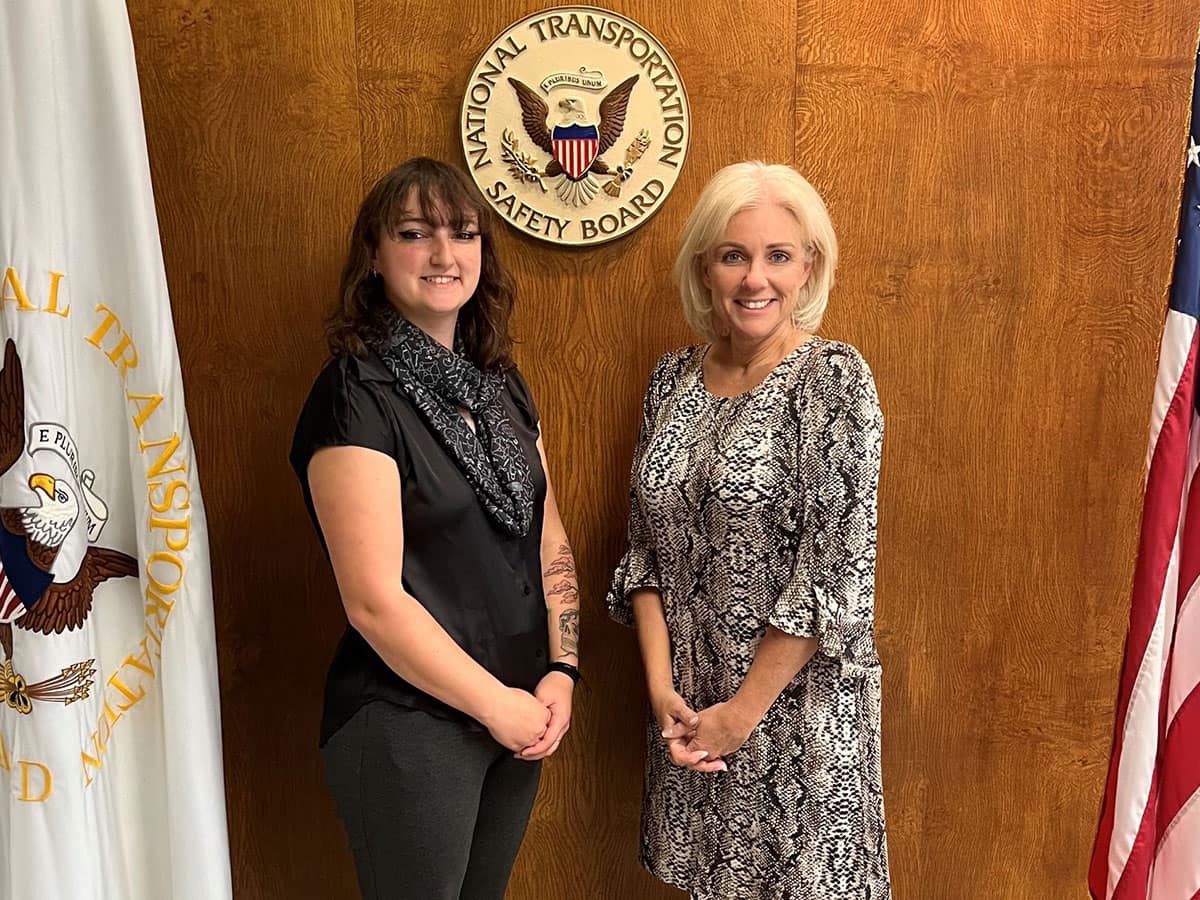
Boeing Support Drives Innovation in Aviation Safety Research
The Boeing Company’s 2023 gift to establish the Boeing Center for Aviation and Aerospace Safety (BCAAS) is already paying big dividends for students who are gaining the knowledge and skills needed to address key challenges in aviation safety. The Center connects students with industry experts, bridging the gap between academia and real-world applications. By using data analytics and human factors insights, students not only prepare for their careers but also contribute to the future of aviation safety.
Human Factors in Loss of Control Accidents
Kelly Hansen, an Aeronautical Science undergraduate, is tackling one of aviation’s most critical issues: loss of control accidents. Working alongside principal investigators Brian Roggow and Esmareil Zarei, she analyzes human errors that lead to these incidents, a leading cause of fatal crashes. The team employs the Human Factors Analysis and Classification System (HFACS) and Dynamic Bayesian Networks to refine prevention models, improve pilot training and develop predictive tools for aviation safety systems.
Hansen, a certified flight instructor, envisions becoming an airline captain and a director of safety or chief pilot. Her research fuels this ambition. “The research I'm involved in, supported by BCAAS, gives me the tools to transform hard data into real-world lessons that help my students avoid the same mistakes others have made,” she says. “In aviation, some mistakes can only be made once, so learning from others is critical.”
The Center has not only enhanced her research skills but has broadened her understanding of aviation safety. “BCAAS support opens doors that wouldn’t be available otherwise,” she explains. “Collaborating with experts and accessing critical resources has helped me grow as both a researcher and an instructor. This project has shown me the real-world impact safety research can have — not just in theory but in practical applications I bring directly to my studies.”
In-Time Safety Data Management and Analysis
Joseph O’Brien, a graduate student in Human Factors, is collaborating with Dr. Kristy Kiernan on a NASA-sponsored project as part of NASA’s Sky for All initiative. O’Brien’s research focuses on developing an In-time Aviation Safety Management System, integrating flight paths, weather and aircraft performance data. The system draws on information from all operations to gather valuable insight from existing data sources while also identifying markers of resilient performance exhibited by crews during routine flights. O’Brien’s work helps identify emerging safety threats, giving air traffic controllers and pilots the ability to respond faster to potential risks. By utilizing a Safety-2 approach, the project aims to implement better training strategies and improve the overall safety of the aviation industry.
O’Brien says his hands-on experience is invaluable. “Being part of such a high-stakes project is a privilege. We’re directly contributing to the future of aviation safety, and I’m both humbled and excited to be a part of this great team as we enter the second year of this project,” he says. Spatial Disorientation and Machine Learning
Katherine Hoffsetz, a Computational Mathematics major, is exploring the complex issue of spatial disorientation, a major cause of general aviation accidents. Collaborating with Dr. Mihhail Berezovski, Hoffsetz uses machine learning and National Transportation Safety Board data to identify factors contributing to spatial disorientation, such as weather conditions and pilot experience. Their model, enhanced by Bayesian machine learning and natural language processing, provides predictions and recommendations to help pilots avoid mishaps.
For Hoffsetz, this project combines her interests. “This project showed me I can apply my love of math to something I’m passionate about and that really matters,” she explains. “I was looking for an intersection between math and aerospace, and this project has been the perfect fit.”
Her exposure to machine learning has also expanded her skill set. “I’ve learned so much about the implementation of machine learning in data science, which I truly value as our world becomes more AI-powered,” she says.
Trust, Fear and Aviation Maintenance Safety Culture
Sang-A-Lee, a Ph.D. candidate in Aviation, collaborates with Dr. Dothang Truong, associate dean for the School of Graduate Studies, to investigate how trust and fear shape the safety culture of aviation maintenance technicians. Their research explores how these emotional factors influence the overall safety culture of aviation maintenance, with the ultimate goal of improving aviation safety.
“This research is crucial because maintenance errors remain a contributing cause of aircraft accidents and incidents, despite technological advancements and stringent regulatory standards. Emotional factors like trust and fear have been overlooked for too long,” Lee explains.
A meeting with industry leaders refined her dissertation approach. “Initially, I was measuring safety culture for maintenance technicians, but after presenting at a BCAAS-hosted meeting, I realized the importance of emotional factors. Their feedback sharpened my direction,” she says.
Funding from the Center will allow her to continue engaging with industry professionals. “The funding will help me attend conferences and meet maintenance technicians, and later incentivize survey participants,” she explains. “This support is key to advancing my research.”
Through research at The Boeing Center for Aviation and Aerospace Safety, students like Kelly Hansen, Joseph O’Brien, Katherine Hoffsetz and Sang-A-Lee are gaining hands-on experience in solving aviation safety issues. The Center isn’t just advancing research – it’s shaping the next generation of aviation professionals. By preparing students to address the industry's most pressing challenges, the Center is ensuring a safer future for aviation, one breakthrough at a time.

A Stipend for Interns Is an Investment in Safety
Thanks to philanthropic support, the Boeing Center was able to provide a $5,000 stipend to help fund student internships with the National Transportation Safety Board this summer.
Working alongside the top talent in the industry, Embry-Riddle students who were able to pursue the internship with this support now have a deeper understanding of the critical work that will position them to one day advance transportation safety.